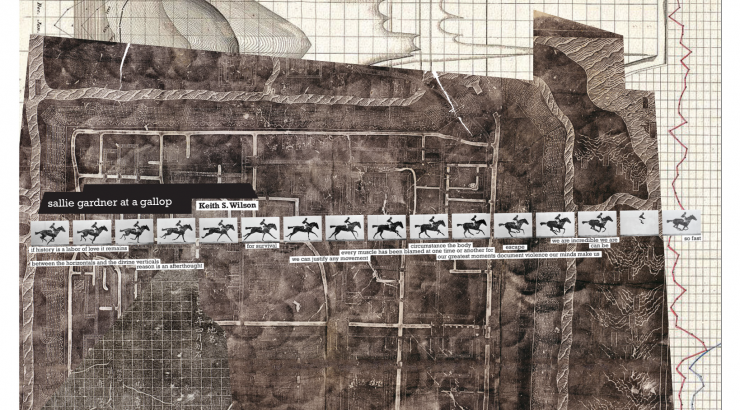
Wilkinson Faculty Grant Success Congrats to 2022-23 Scholarly Creative and Research Seed Award Recipients
May 4, 2022
Congratulations to the eight projects involving Wilkinson College of Arts, Humanities, and Social Sciences faculty as project leaders and principal investigators that were awarded a total of $86,501 from Chapman University’s inaugural Scholarly Creative and Research Seed Funds! The goal of these competitive merit-based internal funding opportunities is to support new and innovative projects in the area of scholarly research and creative activity, and research addressing critical gaps in knowledge related to equity, diversity, and inclusion or to benefit impacted communities. Below is a summary of each of the funded projects.
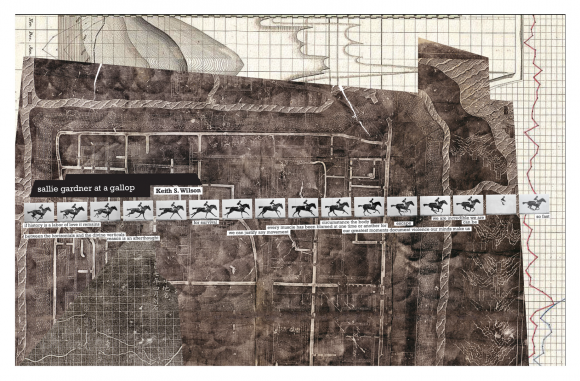 Crip Time, Poetry Curation, and Design Thinking: New Directions for Tab Journal
Crip Time, Poetry Curation, and Design Thinking: New Directions for Tab Journal
Amount Awarded: $10,000
Dr. Anna Leahy, Professor, English
Claudine Jaenichen, Associate Professor, Graphic Design
Tab Journal is a design-driven literary production collaboration across poetry and graphic design. This project applies the concept of crip time—the relationship of the disabled body to time—and uses the design concept of wayshowing/wayfinding to develop best practices for accessibility of visual poetry. How does a given reader experience a poem written for the eye as well as for the language, with visual and linguistic syntax? And how might a poem written for the eye be read by the ear? How might the creative act of poetry account for the all-at-once of visual impression as well as the linearity of reading with the eyes or with the ears? This project proposes a necessary interdisciplinary investigation of these questions about poetry. With accessibility, equity, and inclusion in mind, this project aims to develop integrated options for poems in which visual elements play an important role in the poems’ structure.
Be Ashamed to Die
Amount Awarded: $10,000
Prexy Nesbitt, Presidential Fellow, Peace Studies
Be Ashamed to Die is a book-length autobiographical account of a lifetime of political organizing and social change activity that includes the US civil rights movement, the anti-apartheid movement, the antiwar movement, the labor movement, and alternative education initiatives. Nesbitt will tell the story of his life as a young African American man who, in the 1960s through the 1990s, was involved in most of the major political, cultural, and civic issues of the time. Telling the story of his life in a memoir-like fashion, Nesbitt will draw on archival material and utilize stories, photographs, poetry, song, and verse to convey how he was involved in the struggles, changes, and history of the period. Be Ashamed to Die will constitute a concrete contribution to the growth and a sophisticated awareness of solidarity and Pan Africanist initiatives and undertakings to activists and scholars of activism.
All that is Meant by Citizenship: Women, Social Work, and Development in Ghana, 1945-70s
Amount Awarded: $9,001
Dr. Adwoa Opong, Assistant Professor, History
All That is Meant by Citizenship: Women, Social Work, and Development in Ghana, 1945-1970, charts a new social and intellectual history of decolonization and development in Ghana. The monograph brings the untapped private records of the Federation of Gold Coast (Ghana) Women, family histories, interviews, and recently released records of the Department of Social Welfare into conversation with several primary documents. In foregrounding the nuances in the Federation’s modernist vision, this project places women social workers and those they set out to “uplift” in conversation with political elites of the Ghanaian decolonizing state, western development experts, and Cold War powers, all of whom were involved in the process to define what it meant to be a proper Ghanaian citizen. As the first book-length study of the Federation, this monograph builds on scholarship at the intersection of histories of women, decolonization, and development in twentieth-century Africa.
Migrant Lived Experiences at the Mexico-United States Border
Amount Awarded: $10,000
Dr. Nancy Rios-Contreras, Assistant Professor, Sociology
Migration and border enforcement are social phenomena impacting the Mexico-United States region. This research is designed to capture the lived experience of migrants, community members, and individuals contributing to spaces of migrant assistance. The study aims to capture the lived experience of migrants and their positionality. This qualitative ethnographic research study is conducted through individual interviews with migrants residing around a Mexico border crossing or along Mexican migration routes seeking to migrate to the United States. The methodology includes interviews with government, non-government, private, and public individuals and an optional photo component where migrants take photos of their daily activities. The benefits to science and society may include a better understanding of how to address the needs of migrants to help others in transit and provide better models of assistance.
Tunnel Vision
Amount Awarded: $10,000
Julie Shafer, Associate Professor, Art
Collaborators:
- Joseph Tittlefitz, Master Woodworker, JT Inc. Southern California
- Marya Alford, Research Assistant, Los Angeles based artist
Tunnel Vision is a research-based art project in which Shafer converts several abandoned mineshafts into camera obscuras to make 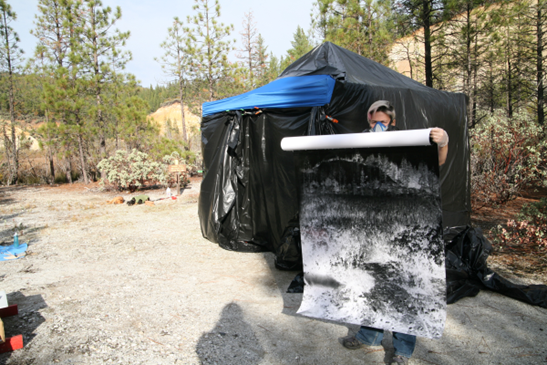 photographs within the mineshaft. The center of each image will be an image from just beyond the mines, and a depiction of the tunnel itself will frame this view. For years Shafer has investigated landscapes that have been devastated by mining and photographed them in ways that allow the remnants or traces of this history to be recorded. This project aims to create 30 unique photographs from a perspective often not considered; those of the mountain, tunnel, or mineshaft. Shafer will have a collapsible camera built by a master woodworker that will be loaded with a photographic paper negative. Each large-scale image will be a one-of-a-kind artwork that can’t be replicated; this technique is unusual for photographs, which are typically endlessly reproducible.
photographs within the mineshaft. The center of each image will be an image from just beyond the mines, and a depiction of the tunnel itself will frame this view. For years Shafer has investigated landscapes that have been devastated by mining and photographed them in ways that allow the remnants or traces of this history to be recorded. This project aims to create 30 unique photographs from a perspective often not considered; those of the mountain, tunnel, or mineshaft. Shafer will have a collapsible camera built by a master woodworker that will be loaded with a photographic paper negative. Each large-scale image will be a one-of-a-kind artwork that can’t be replicated; this technique is unusual for photographs, which are typically endlessly reproducible.
Genetic Underpinnings of Climate Resilient Phenotypes in an Ecologically Significant Invertebrate Grazer
Amount Awarded: $20,000
Dr. Richelle Tanner, Assistant Professor, Environmental Science and Policy
Collaborators:
- Dr. Katharyn Boyer (San Francisco State University)
- Dr. Erik Sotka (College of Charleston)
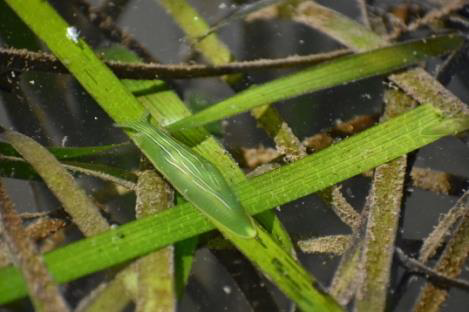 Ongoing climate change increases both mean temperatures and the unpredictability of temperature fluctuations in ecosystems worldwide. Ecological adaptation under current and future climate scenarios is one of the foremost challenges facing environmental scientists today. Not only is there an urgency to understand which species and ecosystem services will be resilient, but there is also a need to understand the mechanisms by which certain species can and will strengthen restoration efforts. By studying Phyllaplysia taylori, a grazer feeding on biofilm that inhibits growth of eelgrass blades, this project seeks to answer fundamental questions in biology that will inform restoration efforts. Learning more about the genetic mechanisms of their physiological resilience under climate change scenarios is the last piece of the puzzle required to fit them into restoration efforts, where they may bolster eelgrass health and shoreline resilience.
Ongoing climate change increases both mean temperatures and the unpredictability of temperature fluctuations in ecosystems worldwide. Ecological adaptation under current and future climate scenarios is one of the foremost challenges facing environmental scientists today. Not only is there an urgency to understand which species and ecosystem services will be resilient, but there is also a need to understand the mechanisms by which certain species can and will strengthen restoration efforts. By studying Phyllaplysia taylori, a grazer feeding on biofilm that inhibits growth of eelgrass blades, this project seeks to answer fundamental questions in biology that will inform restoration efforts. Learning more about the genetic mechanisms of their physiological resilience under climate change scenarios is the last piece of the puzzle required to fit them into restoration efforts, where they may bolster eelgrass health and shoreline resilience.
Martian Pottery: An Exploration of the Feasibility of Making and Using Ceramic Pottery Made from Martian Regolith Simulants
Amount Awarded: $8,500
Dr. Justin Walsh, Associate Professor, Art
David Kiddie, Associate Professor, Art
Collaborator:
- Pascal Lee, Ph.D. (SETI Institute/ Mars Institute/ NASA Ames Research Center)
The prospect of human settlement on Mars will undoubtedly require making things made from local materials. Mars has a lot of dirt, and it 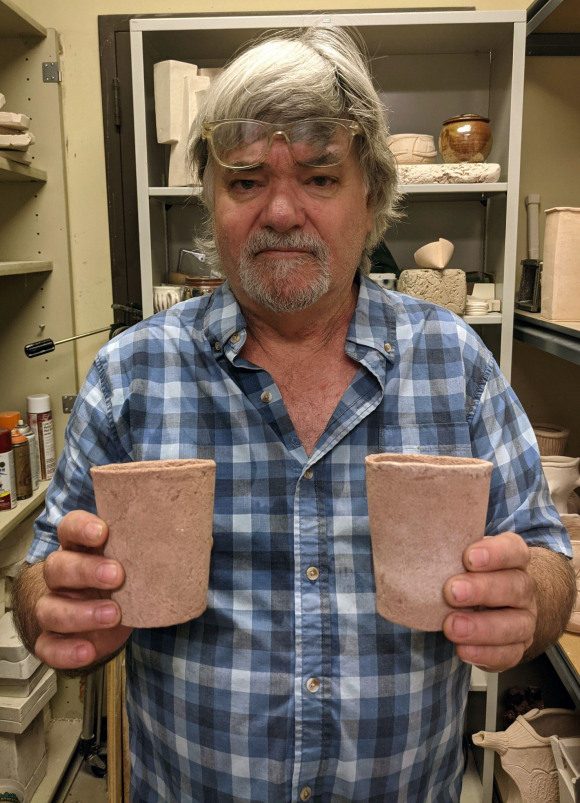 makes sense to start with that. This project seeks to find practical methods for constructing utilitarian ceramic pottery pieces made of Martian materials. Using lab-produced simulant clays, Walsh and Kiddie will experiment with forming and developing a suite of Martian tableware – cups, bowls, plates, etc. Walsh and Kiddie have already worked with small amounts of these simulants and have identified areas requiring further research, such as melting point, cohesion, and surface coatings. Ultimately, this work will respond to key questions about the possibility of future human exploration and colonization of Mars. Findings will undoubtedly force comparisons to Earthly ceramic production, providing insights into ceramic technological developments here and on Mars.
makes sense to start with that. This project seeks to find practical methods for constructing utilitarian ceramic pottery pieces made of Martian materials. Using lab-produced simulant clays, Walsh and Kiddie will experiment with forming and developing a suite of Martian tableware – cups, bowls, plates, etc. Walsh and Kiddie have already worked with small amounts of these simulants and have identified areas requiring further research, such as melting point, cohesion, and surface coatings. Ultimately, this work will respond to key questions about the possibility of future human exploration and colonization of Mars. Findings will undoubtedly force comparisons to Earthly ceramic production, providing insights into ceramic technological developments here and on Mars.
Freedom’s Fortress
Amount Awarded: $9,000
Tom Zoellner, Professor, English
Freedom’s Fortress, a companion volume to Zoellner’s 2020 book, Island on Fire: The Revolt That Ended Slavery in the British Empire, will tell a transformational story of U.S. emancipation from the point of view of enslaved people, who took enormous risks to reach Fort Monroe and the rest of the “contraband camps” that sprung up in Border States shortly after secession. Gen. Benjamin Butler’s novel liminal definition of enslaved people as “contraband” put a fatal crack in the Fugitive Slave Act and created enormous pressure on the Lincoln Administration to declare full emancipation in the South: a process of unwinding 242 years of American slavery that took less than eighteen months to accomplish. This book will show how a world power stumbled and lurched toward abolition not through a humanitarian impulse but via a realpolitik decision driven by the courage and dedication of the enslaved people themselves.
Additionally, we congratulate the interdisciplinary project below, which involves faculty from Attallah College of Educational Studies, School of Communication, and Wilkinson College of Arts, Humanities, and Social Sciences, led by Dr. Sara LaBelle from the School of Communication.
Designing Evidence-Based Messages to Support and Celebrate First-Generation College Students: An Interdisciplinary Investigation
Amount Awarded: $10,000
Dr. Sara LaBelle, School of Communication
Collaborators:
- Dr. Megan Vendemia, School of Communication
- Dr. Quaylan Allen, Attallah College of Educational Studies
- Dr. Stephany Cuevas, Attallah College of Educational Studies
- Claudine Jaenichen, Associate Professor, Graphic Design, Wilkinson College of Arts, Humanities, and Social Sciences
This project aims to develop, refine, and implement evidence-based messages that support first-generation college students (FGCS) in their academic and social endeavors. The objectives are to develop evidence-based messages which highlight the unique strengths of FGCS, assess these messages in a controlled experimental design for their relative effectiveness in increasing positive outcomes for FGCS, and pilot the revised messages at Chapman University and California Baptist University. Professor Jaenichen will conduct a series of workshops to inform the research team on the principles of effective message design and offer critical feedback on the messages used throughout the project. The results of these studies will be used to inform FGCS programming at Chapman University and the production of media kits and scholarly articles to be shared with others working in higher education, student life, and first-generation programming.
We look forward to seeing the outcome of these projects, which will elevate the national visibility and reputation of our entire college, and demonstrate the timeless value and importance of the arts, humanities, and social sciences to better understand our past, present, and future.

